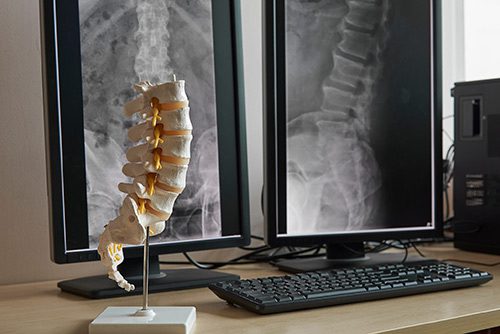Back Pain Doctor Miami
Back pain is the most common diagnosis that Dr. Carter encounters in her practice.
What are the risk factors or causes of back pain?
The list of potential causes of back pain is long. Sometimes back pain can result from a fall, an accident, arthritis, improper exercise technique, occupational hazards, not enough of the right exercise. Often back pain occurs from poor sitting posture. Poor sitting posture can impose significant stress on the spinal structures. Overtime this stress can lead to breakdown of anatomical structures in the lower back and eventually cause pain. Smokers are also at higher risk for back pain. Sometimes back pain happens without an obvious identifiable cause.
What parts of the back are responsible for back pain?
There are several structures in and around the spine that can cause back pain, including:
- Herniated discs
- Degenerative discs
- Inflamed nerves
- Inflamed or arthritic facet joints
- Inflamed sacroiliac (SI) joints
- Muscle spasms or muscle strain
- Sprained/Strained ligaments or tendons
- Spinal fractures (spondylolysis)
- Spinal instability
What are the symptoms of back pain caused by sciatica?
Symptoms of back pain can range from anywhere from a dull ache to severe, shooting pain. Usually when the nerves are inflamed or “pinched”, radiating, shooting pain can occur in the arms or legs. Arm or leg numbness, tingling or weakness can also occur when the nerves are inflamed. When the pain occurs with certain activities or positions, it can give a clue as to what structure is causing the pain

When should I see a back doctor for back pain?
Most initial episodes of back pain don’t typically require a doctor’s visit, as they often resolve on their own. However, you should seek medical attention if:
- The back pain doesn’t improve within a week.
- The pain is very severe.
- The pain subsides but keeps recurring.
- You experience radiating leg pain, numbness, tingling, or weakness.
How is Back Pain Diagnosed and Identified?
A skilled spine specialist can often determine the cause of back pain by taking a detailed medical history and conducting a comprehensive physical examination. Imaging studies, such as x-rays or MRIs, can be useful for ruling out more serious underlying causes. An MRI is particularly valuable for planning spinal injection procedures for back or nerve pain. If a spinal fracture is suspected, a CAT scan may be employed. On occasion, nerve tests like an EMG can help distinguish between a localized nerve issue and a problem involving the spinal nerves, and can also detect actual nerve damage.
Understanding the Common Causes and Risks of Back Pain
Back pain can have many causes, ranging from falls, accidents, and arthritis to improper exercise techniques and occupational hazards. Inadequate or incorrect exercise can also contribute, as can poor sitting posture, which is a common source of back pain. Poor posture places significant stress on the spine, leading to the gradual breakdown of structures in the lower back over time, and eventually causing pain. Smokers face an increased risk as well, likely due to reduced blood flow to the spine. Sometimes, back pain occurs without any clear cause, making it even more challenging to manage. Regardless of the origin, addressing back pain promptly is crucial for preventing chronic pain.
What areas of the back are responsible for back pain?
There are several structures in and around the spine that can cause back pain, including:
- Herniated discs
- Degenerative discs
- Inflamed nerves
- Inflamed or arthritic facet joints
- Inflamed sacroiliac (SI) joints
- Muscle spasms or muscle strain
- Sprained/Strained ligaments or tendons
- Spinal fractures (spondylolysis)
- Spinal instability

What are treatments for back pain?
Treatment for acute back pain typically includes relative rest, ice, temporary use of a simple back brace, and possibly over-the-counter pain relievers like Tylenol or Advil. If the pain persists for more than a week, doctors often prescribe anti-inflammatory medications as the first line of treatment. For cases involving nerve pain, medications like gabapentin or pregabalin may be used. Opioids, such as codeine, morphine, or oxycodone, should be reserved for very severe pain and only used for a short duration. Addressing the underlying causes and following a proper exercise program are crucial for long-term recovery.
In some cases, when back pain is particularly severe or doesn’t improve with standard treatments, spinal injections might be necessary to help reduce inflammation. These injections deliver medication directly to the source of the pain, often providing faster and more targeted relief.
One common option are steroid injections, which contain corticosteroids, known for their strong anti-inflammatory properties. These injections can reduce inflammation around the spinal nerves or within the spinal joints, significantly relieving pain and improving mobility. This approach is particularly effective for conditions like herniated discs, spinal stenosis, or arthritis, where inflammation is a major contributor to pain.
Another option is platelet-rich plasma (PRP) injections. PRP is derived from the patient’s own blood and is rich in growth factors and healing proteins. When injected into the affected area, PRP can stimulate tissue repair and regeneration, which may lead to longer-lasting relief from pain. PRP is often considered for chronic back pain or nerve pain, especially when other treatments have not been effective.
These injections are typically guided by imaging techniques, like fluoroscopy or ultrasound, to ensure accurate placement of the medication. While spinal injections can be very effective, they are usually part of a broader treatment plan that can include physical therapy, lifestyle changes, and sometimes additional medications. It’s important to understand that while these injections can provide significant relief, they are not always a permanent solution and may need to be repeated or combined with other therapies to achieve the best results.
How can I prevent low back pain?
It’s essential to identify the cause of back pain. After experiencing a bout of low back pain, there’s a high likelihood of having another episode within a year. Consulting with a skilled back doctor can help you pinpoint triggers. To reduce the risk of recurrence, consider practicing good sitting posture with a supportive chair. An adjustable height workstation can also be beneficial. Ensure proper sleeping posture and invest in a quality, supportive mattress. Incorporating daily stretching and a regular core-strengthening routine is crucial. When lifting, use proper techniques, relying on your hips and knees rather than your back. If you smoke, quitting is strongly recommended.
Why choose Dr. Carter as my back doctor?
Listen to Dr. Carter explain why you should get a NON-SURGICAL opinion for SPINE PAIN
Dr. Carter has been treating back pain and spinal disorders non-surgically for over 20 years, beginning with a competitive interventional spine and sports medicine New York-based fellowship. She spent 17 years teaching residents and medical students the evaluation and management of back pain at Columbia University – College of Physicians and Surgeons. Dr. Carter is a top back doctor and is considered an expert in her field. Ready to start your recovery journey? Contact us!

Our Services
Dr. Carter is renowned for her exceptional safety record and has been a sought-after instructor for injection techniques nationwide. Her expertise is comprehensive, covering a wide range of areas including back and spine pain, joint and muscle pain, as well as advanced treatments like PRP (Platelet-Rich Plasma) injections and stem cell therapy injections. With years of experience and a commitment to patient safety, Dr. Carter has helped countless individuals manage their pain and improve their quality of life. Her work not only involves treating patients but also educating other medical professionals, ensuring that the highest standards of care are upheld across the country. Through her leadership and dedication, Dr. Carter continues to contribute significantly to the advancement of pain management and regenerative medicine
Dr. Carter’s approach to regenerative medicine, including Platelet-Rich Plasma (PRP) and stem cell therapies, is grounded in the most up-to-date scientific research. Her expertise in these cutting-edge treatments is complemented by her personalized care, ensuring each patient receives a plan specifically tailored to their unique needs and health goals. Dr. Carter doesn’t just focus on the injections themselves; she integrates comprehensive pre-and post-injection rehabilitation programs designed to maximize the effectiveness of the treatments and promote optimal healing. These rehab programs are carefully crafted to align with each patient’s specific objectives, whether it’s pain relief, enhanced mobility, or improved overall function. By combining advanced medical protocols with individualized care, Dr. Carter helps her patients achieve the best possible outcomes in their journey toward recovery and long-term wellness.
Dr. Carter has earned the trust of a diverse clientele, from weekend warriors and professional athletes to performing artists facing career-threatening injuries. Her expertise in treating a wide range of physical conditions allows her to create personalized, holistic treatment plans that address the specific needs of each individual. Whether helping athletes reach their peak performance or enabling artists to return to their craft, Dr. Carter combines advanced medical techniques with a deep understanding of her patients’ unique demands, ensuring they recover, perform, and thrive.


